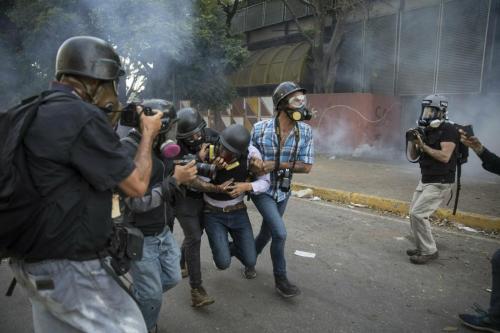Venezuela: Violent Response to Demonstrators
Reports of Killings, Detentions, Media Shutdowns
Reports of violence by security forces against anti-government protests in Venezuela raise fears of widespread gross violations of human rights against opposition supporters in the days to come, Human Rights Watch said on May 03, 2019.

Journalists assist fellow reporter Gregory Jaimes who was injured after being shot by police officers near the La Carlota airbase during clashes with anti-government protestors in Caracas, Venezuela, Wednesday, May 1, 2019.
On May 1, 2019, Venezuelan authorities responded to massive demonstrations in support of Juan Guaidó, the National Assembly president who is challenging Nicolás Maduro for control of Venezuela, with violence and widespread detentions, including targeted violence against journalists covering the protests, according to media reports and reports from Venezuelan groups. Since Guaidó’s announcement of a military and civilian uprising on April 30, authorities have also taken two international news channels off cable TV and shut down a leading Venezuelan radio station.
“Human Rights Watch is extremely concerned about the authorities’ violent response to demonstrators who took to the streets this week,” said José Miguel Vivanco, Americas director at Human Rights Watch. “Venezuelan authorities should know that the international community is closely watching their actions, and they will eventually be held accountable for any abuses committed against detainees or peaceful demonstrators.”
Activists and journalists in Venezuela have reported to Human Rights Watch and through local media that security forces have shot demonstrators with pellets at close range in some instances, and armed pro-government groups have fired on demonstrators with live ammunition in others. Images widely circulated through social media and confirmed by local journalists show an armored vehicle of the Bolivarian National Guard plowing into demonstrators on April 30.
The clashes left dozens of people injured, reports say, and Unicef cited preliminary reports that those injured include children. At least four deaths have been reported, including of a 14-year-old who had been demonstrating in Caracas. Human Rights Watch reviewed photographs, reportedly of one of the people killed, showing a bullet hole in the victim’s head. The victim was allegedly killed by armed pro-government groups, according to local media sources.
The Penal Forum, a leading nongovernmental group, reports that at least 240 people, including 17 children, have been detained since April 30 in Caracas and 13 of the country’s 23 states.
On April 30, Venezuelan authorities took CNN and BBC off cable TV and shut down Radio Caracas Radio. They remain off the air. Leading media freedom groups such as Espacio Público, the National Union of Press Workers, and IPYS Venezuela reported death threats and attacks on journalists covering demonstrations, including beatings and pellets fired at them from close range. In addition, NetBlocks, an organization tracking Internet disruptions and shutdowns, reported that CANTV, a state-run company, limited access to livestreaming platforms while Guaidó was speaking during a rally on April 30.
On May 1, the United Nations Office of the High Commissioner for Human Rights said that it is “extremely worried about reports of excessive use of force by security forces against demonstrators” across the country.
On April 30, Maduro reappointed Gustavo González López to replace the Bolivarian National Intelligence Services (SEBIN) director, General Manuel Ricardo Cristopher Figuera, who broke ranks with Maduro. During González López’s time as SEBIN director, from 2014 to 2018, SEBIN agents participated in arbitrary arrests and abuses against detainees including torture.
“The reappointment of González López should raise the international alarm given his deplorable record of atrocities,” Vivanco said.
Source:Human Rights Watch
- 311 reads
Human Rights
Ringing FOWPAL’s Peace Bell for the World:Nobel Peace Prize Laureates’ Visions and Actions

Protecting the World’s Cultural Diversity for a Sustainable Future

The Peace Bell Resonates at the 27th Eurasian Economic Summit

Declaration of World Day of the Power of Hope Endorsed by People in 158 Nations

Puppet Show I International Friendship Day 2020

